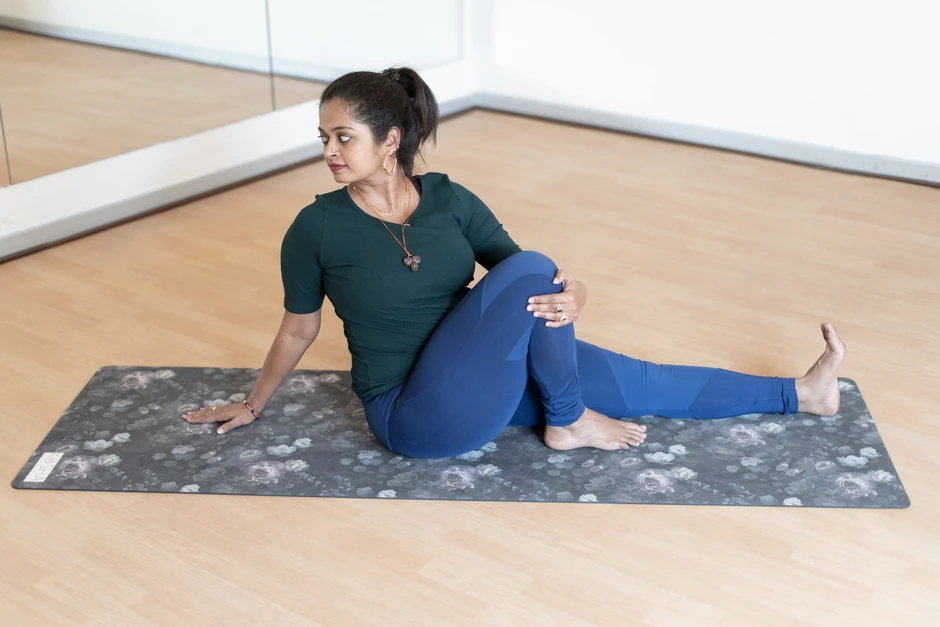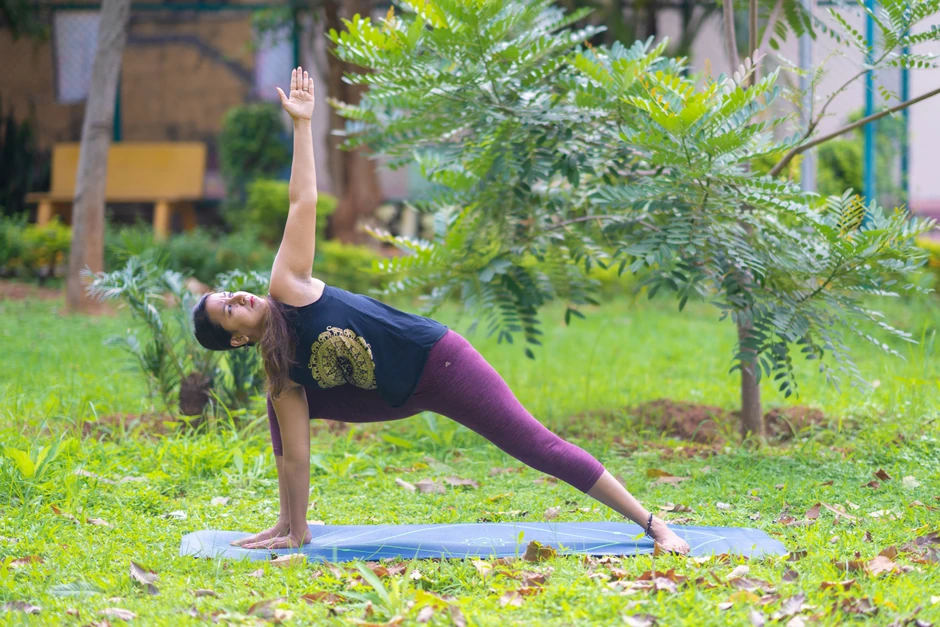

Pregnancy is a beautiful journey that comes with its own set of challenges. Digestive issues are common during pregnancy due to various hormonal changes and pressure on the digestive system. Practicing yoga can help pregnant women to alleviate these issues and improve digestion.
During pregnancy, hormonal changes and physical changes to the body can lead to digestive issues such as constipation, bloating, and heartburn. These issues can be uncomfortable and make it difficult to eat and sleep properly. Fortunately, there are several yoga poses and practices that can help alleviate these digestive issues and promote comfort during pregnancy.
[inline-CTA-1]
Sure, here are some more details on each of the ten yoga poses for digestion during pregnancy, along with instructions on how to do them:

This pose is done on hands and knees. Start with a neutral spine, then inhale and arch your back, lifting your head and tailbone towards the ceiling (Cow). Exhale and round your spine, bringing your chin to your chest and tucking your tailbone (Cat). Repeat for several breaths.

Begin on hands and knees, then lift your hips up and back into an inverted V shape. Lengthen through the spine and press your palms and feet firmly into the ground.

Sit on the floor with your legs extended in front of you. Bend your right knee and cross your foot over your left thigh. Bring your left arm around your right knee and twist your torso to the right. Hold for several breaths, then switch sides.
_optimized.webp)
Stand with your feet wide apart. Turn your right foot out and reach your right hand towards your right ankle, while lifting your left arm towards the ceiling. Keep both legs straight and gaze up towards your left hand.

From Triangle pose, bring your right elbow to your right knee and reach your left arm over your head, creating a straight line from your left heel to your fingertips.

From Extended side angle pose, bring your left hand to your left hip and pivot your right foot so that it's pointing forward. Bend your right knee and reach your arms out to either side, gazing over your right fingertips.

Begin on hands and knees, then bring your hips back towards your heels and stretch your arms out in front of you. Rest your forehead on the ground and breathe deeply.

Lie on your back and bring your knees towards your chest. Hold onto the outsides of your feet and draw your knees towards your armpits, while gently rocking from side to side.

Lie on your back with your knees bent and feet on the ground. Lift your hips up towards the ceiling, pressing your feet and arms into the ground for support.

Lie on your back with your arms and legs extended, palms facing up. Relax your body completely and focus on deep, slow breathing.
By practicing these yoga poses regularly, pregnant women can promote digestion and relieve discomfort during pregnancy. As always, it's important to consult with a healthcare provider before starting a new exercise routine during pregnancy.
[inline-CTA-2]
In addition to specific yoga poses, there are also yoga practices that can help promote healthy digestion during pregnancy. Here are some practices to consider:
Breathwork: Deep breathing exercises can help calm the mind and body, reduce stress and anxiety, and stimulate the digestive system. Practice diaphragmatic breathing, where you inhale deeply into your belly and exhale slowly through your nose.
Mindful eating: Paying attention to what and how you eat can also support healthy digestion. Eat slowly, chew your food thoroughly, and avoid overeating. Also, try to incorporate more whole foods, fiber, and hydrating foods into your diet.
Relaxation techniques: Stress can have a negative impact on digestion, so it's important to incorporate relaxation techniques into your routine. Consider practicing yoga nidra, a deep relaxation technique that involves guided meditation and visualization.
Gentle movement: Light physical activity, such as walking or gentle yoga, can help stimulate digestion and relieve constipation. Be sure to talk to your healthcare provider about what types of exercise are safe for you during pregnancy.
By incorporating these yoga practices into your routine, you can support healthy digestion during pregnancy and reduce discomfort. Remember to always listen to your body and consult with your healthcare provider before starting any new exercise or relaxation routine.
One effective breathing technique for promoting healthy digestion during pregnancy is called "Alternate Nostril Breathing" or "Nadi Shodhana Pranayama". Here's how to practice it:
Sit comfortably with your spine straight and your left hand resting on your left knee.
With your right hand, bring your index and middle fingers to rest between your eyebrows. Use your thumb to close your right nostril and your ring finger to close your left nostril.
Inhale deeply through your left nostril, then use your ring finger to close your left nostril and exhale through your right nostril.
Inhale through your right nostril, then use your thumb to close your right nostril and exhale through your left nostril.
Repeat this cycle, inhaling through the opposite nostril each time and exhaling through the other nostril.
Continue for several cycles, then release your hand and sit quietly for a few moments, focusing on your breath and any sensations in your body.
Alternate Nostril Breathing can help calm the mind, reduce stress and anxiety, and stimulate the digestive system. It's safe and effective for most pregnant women, but be sure to talk to your healthcare provider before starting any new breathing or exercise routine.
Meditation and mindfulness can also be helpful practices to complement yoga for digestion during pregnancy. Here are some ways to incorporate these practices:
Body Scan Meditation: This involves lying down in a comfortable position and bringing awareness to each part of the body, starting from the toes and moving up to the head. This can help release tension and promote relaxation in the body.
Mindful Eating: During meals, take time to fully engage with the senses and appreciate the taste, texture, and smell of each bite. This can help improve digestion and reduce overeating.
Visualization: During meditation or yoga practice, visualize the digestive system working efficiently and comfortably. This can help alleviate any discomfort or digestive issues.
Breath Awareness: During meditation or yoga practice, focus on the breath and its movement in the body. This can help calm the mind and promote relaxation, which can in turn help alleviate digestive issues.
Incorporating these practices into a yoga routine for digestion during pregnancy can help enhance the benefits of the physical yoga poses and promote overall wellbeing. Remember to always consult with your healthcare provider before starting any new exercise or meditation routine
While practicing yoga during pregnancy can be beneficial, it's important to take certain precautions and follow some tips to ensure a safe and comfortable practice. Here are some things to keep in mind:
Talk to your healthcare provider: Before starting any new exercise routine, it's important to consult with your healthcare provider to ensure it's safe for you and your baby.
Avoid certain poses: Some yoga poses, such as deep twists, backbends, and inversions, may not be safe during pregnancy. Avoid any poses that feel uncomfortable or strain your abdomen.
Use props: Props, such as blocks, blankets, and straps, can help support your body and make certain poses more comfortable.
Stay hydrated: Drink plenty of water before, during, and after your practice to stay hydrated.
Take breaks: Listen to your body and take breaks as needed. It's okay to modify or skip certain poses if they don't feel right.
Practice in a safe environment: Make sure you're practicing in a safe and comfortable environment, with enough space and appropriate temperature.
Practice with a qualified teacher: Consider taking prenatal yoga classes with a qualified teacher who has experience working with pregnant women.
By following these precautions and tips, you can practice yoga safely and comfortably during pregnancy and enjoy its many benefits.
Yoga can be a great way to support digestive health during pregnancy. By practicing specific yoga poses and incorporating yoga into a daily routine, pregnant women can alleviate common digestive issues and improve overall well-being. It's important to practice yoga safely and consult with a qualified instructor to ensure a safe and enjoyable practice.
Yoga can be a safe and effective way to support digestive health during pregnancy. Prenatal yoga classes that are specifically designed for pregnant women can be a great option, as they will focus on poses and movements that are safe and beneficial during this time. Seated spinal twists can be especially helpful for promoting healthy digestion, as they gently massage the organs and help to increase blood flow to the digestive system. Other recommended poses for digestion during pregnancy include cat-cow stretches, downward-facing dog, and wide-legged forward folds.
Comfort during pregnancy can be supported by a variety of practices, including yoga, meditation, mindfulness, and breathing techniques. In addition, it is important to prioritize healthy habits such as eating a balanced diet, staying hydrated, getting enough rest, and avoiding activities that cause discomfort. Yoga and meditation can be particularly helpful for promoting relaxation and reducing stress, which can help to ease physical discomfort and promote overall well-being during pregnancy.
Yoga poses that involve twists can be especially beneficial for digestion, as they help to massage and stimulate the organs in the digestive system. Some recommended poses include seated spinal twists, half lord of the fishes pose, and supine spinal twists. Breathing exercises such as kapalbhati pranayama and ujjayi breath can also be helpful for promoting healthy digestion.
The best time to practice yoga for digestion will vary depending on the individual. Generally, it is recommended to practice yoga on an empty stomach, either early in the morning or in the evening before bedtime. However, it is important to listen to your body and choose a time that works best for you.
Yoga can be an effective way to support digestive health and promote a strong digestive system. Some yoga poses and practices that can help to support healthy digestion include twists, forward folds, gentle backbends, and breathing exercises such as kapalbhati pranayama and ujjayi breath. In addition, maintaining a healthy diet that is high in fiber and staying hydrated can also support healthy digestion.
Yoga can have a variety of benefits for the digestive system, including increasing blood flow and oxygenation to the organs in the digestive system, stimulating the parasympathetic nervous system (which is responsible for the "rest and digest" state), reducing stress and tension in the body, and promoting relaxation. By supporting healthy digestion, yoga can help to improve overall health and well-being.

Receive personalized guidance tailored to your unique fitness goals, live with a dedicated coach—no credit card required.